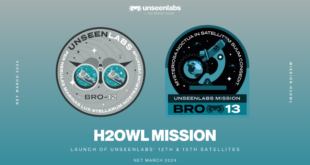
Berlin, 8 September 2020. – The Technische Universität Berlin, a leading German university specializing in space engineering, and Exolaunch, a rideshare launch and deployment solutions provider, have reached a launch agreement for the SALSAT nanosatellite.
Under the agreement, Exolaunch is providing launch, mission management, and integration services for the Technische Universität Berlin on a Soyuz-2 rideshare mission later this month.
SALSAT (Spectrum AnaLysis SATellite) aims to analyze the global spectrum use of S-band and VHF, UHF amateur radio bands. This analysis is required due to the increasing number of users and the intensification of radio communication, which is leading to an escalating probability of interference between radio signals. It will analyze the global spectrum usage with SALSA, a spectrum analyzer payload based on a Software Defined Radio.
SALSAT also features a variety of unique secondary payloads such as a Linux based, intelligent onboard processing system to analyze the spectrum on-board. The nanosatellite also features novel, three-axis Fluid-Dynamic Actuator (FDA).
SALSAT will be the first satellite in space to demonstrate three-axis attitude control with its FDAs. The mission’s collected spectrum data will be made available to the public through a web portal which international researchers, study groups, and amateur radio enthusiasts can access. The mission is funded by the German Bundestag through the Federal Ministry for Economic Affairs and Energy and the Deutsche Zentrum für Luft- und Raumfahrt e.V. (DLR).
SALSAT is a part of the September Soyuz rideshare mission – Exolaunch’s seventh mission with Soyuz-2 that is manifested by the company. On this mission, Exolaunch will deploy a cluster of 15 smallsats into a sun-synchronous orbit for its customers from Europe, the UAE, Canada, and the USA.




